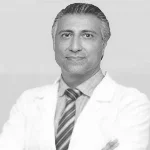
Dr. Omid Modiramani is a highly experienced medical oncologist and clinical hematologist in Dubai with more than 12 years of […]
Esophageal cancer is a serious disease that develops in the esophagus—the muscular tube responsible for moving food and liquid from your throat to your stomach. This type of cancer begins when cells in the esophageal lining mutate and start growing uncontrollably, eventually forming a tumor that can obstruct the passage of food.
Understanding the type is crucial, as it influences treatment decisions. The two primary forms are:
Squamous Cell Carcinoma: This type begins in the thin, flat cells (squamous cells) that line the surface of the esophagus. It can occur anywhere along the esophagus but is most common in the upper and middle portions. Its development is strongly linked to smoking and heavy alcohol use.
Adenocarcinoma: This type starts in the glandular cells of the esophagus. It typically occurs in the lower part of the esophagus, near the stomach. The primary risk factor is long-term gastroesophageal reflux disease (GERD), which can lead to a pre-cancerous condition called Barrett’s esophagus.
Several factors can increase a person’s likelihood of developing esophageal cancer:
Tobacco Use: This includes smoking cigarettes, cigars, and using smokeless tobacco.
Heavy Alcohol Consumption: The risk increases with the amount and duration of alcohol use.
Chronic GERD and Barrett’s Esophagus: Persistent acid reflux can damage esophageal cells over time.
Obesity: Excess body weight increases pressure on the stomach, contributing to acid reflux.
Diet: A diet low in fruits and vegetables may be associated with a higher risk.
Age and Gender: The risk increases with age, and it is more common in men.
Early-stage esophageal cancer often causes no symptoms. However, as the tumor grows, the following signs may appear:
Difficulty Swallowing (Dysphagia): This is the most common symptom. It may feel like food is stuck in your throat or chest. It often starts with solid foods and progresses to liquids.
Unintended Weight Loss: This can result from both difficulty eating and the cancer itself.
Chest Pain, Pressure, or Burning: Discomfort that can be mistaken for heartburn.
Worsening Indigestion or Heartburn.
Persistent Cough or Hoarseness.
Coughing up Blood or Vomiting.
If esophageal cancer is suspected, doctors will perform several tests:
Upper Endoscopy: The primary diagnostic tool. A thin, flexible tube with a camera (endoscope) is passed down your throat, allowing the doctor to examine your esophagus and take a tissue sample (biopsy) if any abnormalities are found.
Imaging Tests: Such as CT scans, PET scans, or endoscopic ultrasound, are used to determine the stage of the cancer—whether it has spread to lymph nodes or other organs.
Treatment depends on the cancer’s type, stage, location, and the patient’s overall health. A multidisciplinary team often recommends a combination of:
Surgery: To remove the cancerous portion of the esophagus (esophagectomy).
Radiation Therapy: Using high-energy beams to kill cancer cells, often used before surgery to shrink tumors or after to destroy remaining cells.
Chemotherapy: Using powerful drugs to kill cancer cells throughout the body, frequently combined with radiation therapy (chemoradiation).
Targeted Therapy & Immunotherapy: Newer treatments that attack specific weaknesses in cancer cells or boost the body’s immune system to fight the cancer.
Awareness of the risk factors and early symptoms, particularly persistent difficulty swallowing, is critical. If you experience any of these signs, especially if you have known risk factors, it is essential to consult a gastroenterologist promptly. Early detection significantly improves the chances of successful treatment.

Dr. Omid Modiramani is a highly experienced medical oncologist and clinical hematologist in Dubai with more than 12 years of […]

Dr. Saman Nikeghbalian is a highly esteemed general surgeon and a pioneering figure in the field of organ transplantation in […]

Dr. Seyed Ziaeddin Rasihashemi is an esteemed Associate Professor of Thoracic Surgery at Tabriz University of Medical Sciences in Iran. […]

Dr. Maryam Mirzaei Moghadam is a highly skilled radiation oncologist in Tehran specializing in chemotherapy, radiotherapy, and advanced cancer treatments. […]

Dr. Helaleh Khoshbakht is a highly respected radiation oncologist in Tehran with extensive expertise in treating various cancers, including breast, […]

Dr. Hossein Foudazi is a prominent radiation oncologist based in Tehran, Iran, who has a significant role in the field […]

Dr. Mohammad Roshani, born in January 1974, is a highly accomplished gastroenterologist and internal medicine specialist based in Tehran, Iran. With an impressive academic […]

Dr. Hasanali Metanat is a board-certified gastroenterologist and hepatologist with over 25 years of clinical experience in Tehran. Recognized as one of Iran’s foremost digestive […]

Credentials and Specialized Expertise Dr. Gholamreza Moghimi is a highly skilled gastroenterologist in Tehran, renowned for his advanced diagnostic and therapeutic approaches […]

Dr. Mohammad Amani is a distinguished gastroenterologist based in Tehran, renowned for his expertise in gastroenterology, hepatology, and endoscopy. With […]

Dr. Abdulreza Soraghi is a highly skilled and board-certified Adult Gastroenterology & Liver Specialist practicing in Tehran, Iran. With over 19 years of […]